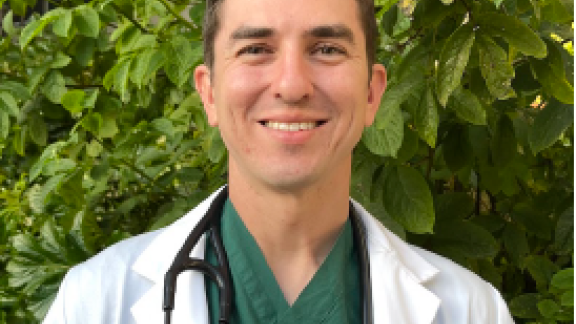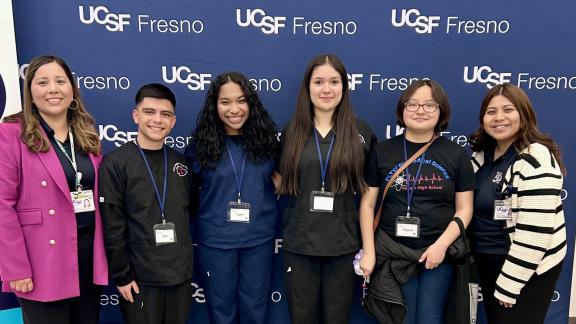
At UCSF Fresno, the Hepatology Fellowship Program introduces fellows to inpatient and outpatient management of patients with a wide range of acute and chronic liver diseases.
Marina Roytman, MD, Liver Program Director at UCSF Fresno, teaches hepatology to gastroenterology fellows, internal medicine residents, medical students and advanced practice providers. One of her academic interests includes viral hepatitis.
“I love to teach which is one of the main reasons that I am at UCSF Fresno. I give lectures on a variety of liver disease topics including viral hepatitis B and C to medical students, residents, fellows and advance practice providers,” said Dr. Roytman. “I try to cast as wide of a net as possible to educate the clinicians who will potentially be in the situation of being able to diagnose and treat the patient.”
Prevalence of liver disease is increasing in the U.S. population in general and in young people in particular due to an increase in obesity, metabolic risk factors, alcohol misuse disorder, and an opioid epidemic. Therefore, it is critical for all physicians to be familiar and comfortable diagnosing and taking care of patients with liver disease.
Jennifer Yoon, MD, is a second-year gastroenterology fellow who previously completed the hepatology fellowship. The program exceeded her expectations by providing and enriching the learning environment, exposure to clinical skills and significant involvement in patient care.
“The experience as a hepatology fellow is impactful and rewarding. You work with a lot of patients in the Central Valley, and there’s just a lot of learning that happens,” said Dr. Yoon.
Fellows gain a broad knowledge of the physiology of the liver and a thorough knowledge of the management of patients with hepatobiliary diseases. Dr. Roytman said they are exposed to didactic lectures, case conferences, tumor board meetings, selected readings, and clinical experience that jointly cover all areas.
Through their research, Dr. Roytman, residents and fellows found that alcohol related hepatitis increased during the COVID-19 pandemic in 2020. In 2021, they published an article on their research findings, The Pandemic Within the Pandemic.
There is a large body of evidence that shows an increasing rate of chronic hepatitis C as the consequence of the ongoing crisis. “The goal is to diagnose hepatitis C early because we now have a true cure for it. Once diagnosed with hepatitis C through a blood test, the patient will be prescribed medication to take from eight to 12 weeks and amazingly and remarkably be cured of hepatitis C,” said Dr. Roytman.
Dr. Yoon is grateful to be learning from attendings (faculty members), including Dr. Roytman who she says is incredibly involved in the hepatology fellow's education.
“There is a lot of pathology here, so there’s so much opportunity to learn here and I’m definitely grateful that I went through the hepatology program,” said Dr. Yoon. “As a GI fellow, I think I am definitely using all of the information and all of the skills that I acquired as a hepatology fellow.”
The UCSF Fresno Hepatology Fellowship was established in 2022 and is a one-year program within the Department of Internal Medicine that accepts one fellow per year.
In addition to teaching fellows, residents and students, Dr. Roytman started the UCSF Fresno Liver Expo, a free event for the community to learn about liver health through lectures, health screenings and other activities. This year's event will take place on Saturday, Oct. 12, 2024, in person at UCSF Fresno and via Zoom webinar.





